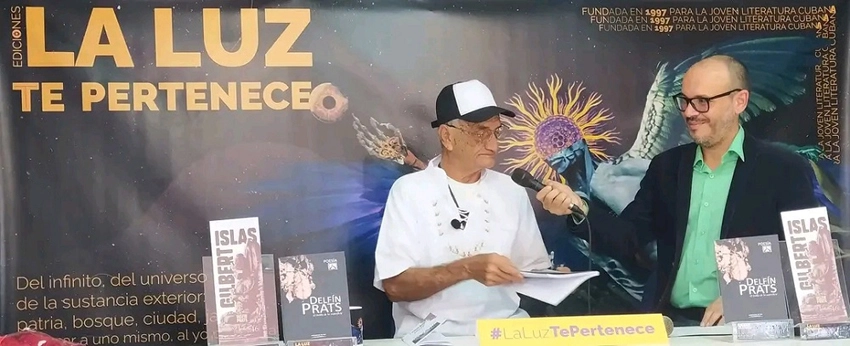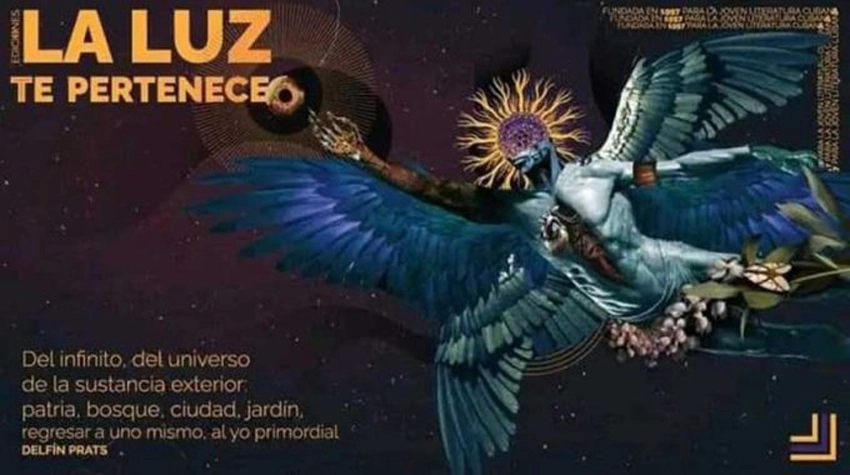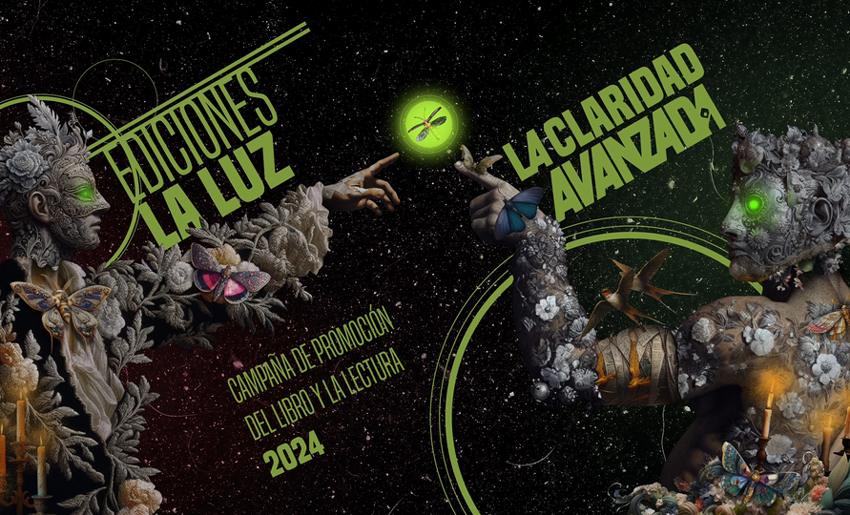To achieve that a publishing house reaches its best definition, with a catalog of works and authors that gathers diverse times and profiles, settled in works that combine elegance and beauty, is a task to distinguish its presence in the horizons of the island and, in a special way, it is encouraging to see how, in the face of circumstantial adversities or material deterioration, the fact of the book in paper format maintains its character, as a prow ship of the cultural heritage that represents the highest tenacity of humanity.
Founded in 1997 in Holguin, Ediciones La Luz, with the guidance of poet Luis Yuseff and a team that is constantly renewed, constitutes the aforementioned, to endorse a task that is well expressed in the logo, a candlestick that illuminates from the spine of his books, clarity, punctual and committed to the values of literature, a guide to delve into names coming from anywhere in the Cuban geography, or from other regions either in Latin America or elsewhere, always in favor of the most accented quality.
That’s how those Holguin editions of the Hermanos Saiz Association have managed to become one of the highest records of Cuban books, and not only within the island’s borders, but far beyond, which also allows us to define it as a Cuban publishing house with a deep Latin American vocation: the fact that significant figures of verbal creation in that field have accepted to publish in them, such as Chilean novelist Hernan Rivera Letelier or Colombian poet Juan Manuel Roca, corroborate it.
In that sense, it is equally flattering to see how the poetic work of Mexican José Emilio Pacheco (1939-2014), one of the greats in Latin America, winner of the Cervantes Prize for Literature in 2009, has been published in La Luz in a careful anthology, En el último día del mundo, prepared by Erian Peña, and courtesy of the poet’s relatives -it is worth adding that Mexican Elena Poniatowska, also winner of the Cervantes Prize, offered her consent to include a text of his as an introduction-.
A very relevant line of the publishing house is the collection that gathers the books of the Celestino Short Story Prize, an annual contest of national scope, which already offers a sample that validates the best of the genre among young people; Umbralismo: una antología, by Rafael Ramírez; Los macabeos, by Abel Fernández-Larrea; Nube oscura alrededor de la cabeza, by Julián Marcel; La máquina de recuerdos, by Evelin Queipo; and Boustrophilia, by Roberto Ráez: which for the author of this column show a commendable level.
Likewise, the fact of putting in the hands of readers the most recent work of young poets is an experience that places the well-versed and persevering Holguin publishing house in the most different horizon for its efforts and achievements; there are many, but when it comes to remember, the office of reader brings me right now two: Carne roja, by Reynaldo Zaldívar, and Laminarios, by Camilo Noa, titles that propose the beginnings of ways that are affirmed in the pursuit of singularity and aptitude.
Another collection to have among the most estimable achievements of La Luz is Analekta, which already totals 52 with the recent anthology Castas arenas de la noche, by Emilio Ballagas: these are elegant and moderate notebooks in volume, in a list that combines recent voices and others of the already established collection, to form a range as suggestive as it is attractive: samples to distinguish, apart from the aforementioned, are Quiero escribir con el silencio vivo, by Fina Garcia Marruz, and Una cantidad misteriosa, by Cintio Vitier.
An unavoidable chapter in these editions is that of very special projects, as is the case of two books: Un enorme juego con el tiempo, an interview with Cosme Proenza by Alejandra Rodriguez Segura -accompanied by the dvd containing the filmmaker’s documentary-, a journey into the creative intimacy of that great master of Cuban painting; and Monstruos. Pequeño inventario, by Maikel Rodriguez Calviño, a meticulous title that approaches the imaginary of diverse cultures and literary traditions, beautifully illustrated.
An event to be highlighted in the sum of fortune brought to the Cuban book airs by La Luz is the publication of the complete poetry of Delfin Prats, El brillo de la superficie, with a prologue by Ronel Gonzalez -a careful offering that includes a CD with the author reading some of his poems, with the author reading some of his poems-, proof of a gratifying initiative undertaken by the publishing house, to distinguish the legacy of one of the legendary voices of Cuban poetry -of unalterable roots in the admiration of young poets-, National Prize of Literature 2022.
Presentation by Ediciones La Luz, Holguín

The exercise of literary translation, as a way of approaching other areas of verbal creation, has been capital in La Luz -it is worth remembering what Octavio Paz, 1990 Nobel Prize in Literature, pointed out: “Passion and chance but also carpentry work, masonry, watchmaking, gardening, electricity, plumbing; in a few words: verbal industry. Poetic translation requires the use of resources analogous to those of creation, only in a different direction”-, and with it, his path to readers is praiseworthy.
In such a path, titles like Saint-John Perse’s The Sea in a Sky; Allen Ginsberg’s We Will Buy the City; and Jacques Prevert’s Instructions for Drawing a Bird -translated, respectively, for this occasion, by Manuel Garcia Verdecia and Ariel Lopez Home, the first two, and the second by Irina Chaveco and Elizabeth Soto-, warn of the hierarchy that for an endeavor of such nature -a first-rate threat in the permanent dialogue between languages and cultures-, it is essential for a publishing expansion.
And the recent collection Abrirse las constelaciones, with a very shrewd attraction in its design and accuracy in its purpose -new texts by authors who, as the name suggests, open up areas of the firmament at the time of reading-, to deliver firsts that are placed in paths to be taken into account: Examples such as the poetry collections Hojarasca de las formas, by Erian Peña; and Rituales de la culpa, by José Luis Laguarda; the novel Al son de la calavera, by Andrés Cabrera; and the theatrical piece Teoría de las flores salvajes, by Katherine Perzant, affirm this.
Books in paper format -the inheritance treasured by El universo en un junco, to put it in the manner of Spanish writer Irene Vallejo, recalling the endearing nature of reading civilization-, but also splendid audiobooks, posters, literary days, events with children and titles for them, relentless promotion on media platforms, recall what is proposed in the verses of Delfín Prats: “…they looked far beyond /they saw /on the other side of the horizon…”. This is confirmed when La Luz opens the constellations.

- Maggie Mateo returns as a storyteller - 21 de May de 2025
- Farewell to Mario, Don Miguel’s disciple - 16 de April de 2025
- The savage detective and the unsubmissive translator - 7 de April de 2025

